Canine cognitive dysfunction (CCD) is similar to dementia or Alzheimers in humans—and can be heartbreaking. With hope and compassion, Dr. Julie Buzby shares a complete guide to cognitive dysfunction in dogs. Learn the symptoms, new treatment options (including supplements), how your vet may use a CCD rating scale for diagnosis, and the outlook for affected dogs. Plus, find a special section focused on how to manage the late-night disturbances that are commonly associated with cognitive decline. Help is here.

- What is canine cognitive dysfunction?
- What are the clinical signs of cognitive dysfunction in dogs?
- What are the causes of canine cognitive disorder?
- How will my vet diagnose canine cognitive dysfunction?
- What are the treatment options for canine cognitive dysfunction?
- Tips for at-home care: 5 things you can do for your dog
- How canine cognitive dysfunction disrupts sleep-wake patterns
- What is the prognosis for dogs with CCD?
- Partnering with your veterinarian for your senior dog's sake
- Is your senior dog showing signs of CCD?
What is canine cognitive dysfunction?
Canine cognitive dysfunction (also called canine cognitive disorder or CCD in dogs) is a relatively common disorder in older dogs that involves changes in your dog’s brain and decreased cognitive functions. It is estimated that CCD symptoms occur in 68% of dogs by the age of 16. In other words, nearly two-thirds of 15- to 16-year-old senior dogs have some manner of doggie dementia.
Equally important are the number of cases of cognitive dysfunction that go undiagnosed. According to research studies, in a group of dogs that are at least eight years of age, the incidence of CCD is expected to be around 14%. However, less than 2% have been diagnosed with this medical condition.
Often, dog parents chalk up behavior changes to “normal aging” when CCD may actually be the culprit.
The following table shows the percent of dogs at certain age intervals affected by at least one impairment associated with CCD.
| AGE OF DOG | % AFFECTED |
| 11-12 years | 28% |
| 14 years | 48% |
| 16 years | 68% |

What are the clinical signs of cognitive dysfunction in dogs?
Canine cognitive dysfunction syndrome is associated with degenerative changes in the brain similar to dementia and Alzheimer’s disease in people. These changes affect the function of the brain and can affect how your dog perceives the world, their mental state/awareness, and their ability to process sensory information.
Often, canine cognitive dysfunction syndrome is first noted by owners as unusual behavioral changes. For example, an owner may notice that his or her dog is less responsive or connected to them emotionally, appears confused or disoriented, or has a change in established sleep-wake patterns—often increasing nocturnal activity.
If you are concerned that your aging dog may have this medical condition, watch for some common clinical signs including:
| CLINICAL SIGNS: | HOW YOUR DOG MAY ACT: |
| Anxiety | Increased panting and pacing, unable to rest or relax, newly developed separation anxiety or noise phobias |
| Less engaged | Loss of interest in you or the family, sleeping more often, not wanting to play, decreased activity levels |
| Pacing | Repetitive walking around the house or walking in circles |
| Disoriented | Gets “stuck” in corners of the house, can’t remember how to go around furniture, forgetting where the water or food dish is located, unable to find door to outside |
| House soiling | Previously potty trained, but now has accidents |
| Change in sleep-wake cycles | Wakeful and roaming at nighttime, unable to settle down and sleep at night |
To read about the manifestation of these signs in more detail, check out my article, 5 Signs of Dementia in Dogs. Then, if you think your dog is experiencing any of these signs, you may want to complete my canine cognitive dysfunction checklist and share it with your veterinarian. (Also, since changes in sleep-wake cycles can be especially disruptive, you’ll find helpful solutions at the end of this article.)

What are the causes of canine cognitive disorder?
Just like in humans, dogs undergo some significant brain changes as they age. These changes include:
Brain atrophy
Over time, the total weight and size of the brain decreases (i.e. the brain atrophies). This is especially noticeable in the cerebral cortex, basal ganglia, and cerebellar cortex.
The cerebral cortex is the center for learning ability, memory, personality, and information processing in the brain. The basal ganglia play a large role in learning, cognition, and emotion. Since the cerebral cortex and basal ganglia help make your dog who he or she is, it makes sense that loss of neurons in those areas could lead to changes in personality and behavior.
The process of brain atrophy also affects the cerebellar cortex. This portion of the brain is responsible for balance and coordination of movements. Dogs with CCD may have tremors or a tendency to sway or fall. They may also have difficulty with movement. However, these signs also occur in older dogs for a variety of reasons other than CCD. Thus, vets tend to place more emphasis on the mental signs of CCD during the diagnostic process.
Accumulation of ß amyloid protein
This abnormal protein may build up and form plaques in certain areas of the brain. This leads to decreased brain activity. Interestingly, this same phenomenon occurs in humans with Alzheimer’s Disease. Deposits of ß amyloid may lead to loss of neurons, damage to signaling pathways, and reduced numbers of neurotransmitters (i.e. signaling chemicals in the brain). It may also interfere with the way the mitochondria (i.e. intracellular energy factories) in the brain work, which leads to less energy for the brain.
Researchers believe that small clots, microscopic bleeds, or other changes in brain blood vessels may compromise brain blood flow and result in ß amyloid deposition. Unfortunately, these ß amyloid deposits then lead to more blood vessel damage, which leads to more ß amyloid deposits in a vicious circle.
While more research is needed, many scientists do believe that cognitive impairment increases as the amount of ß amyloid in the brain increases. One study indicated that dogs with increased ß amyloid deposition tended to do worse on learning tests, which supports that theory.
Neurotransmitter and other brain chemical changes
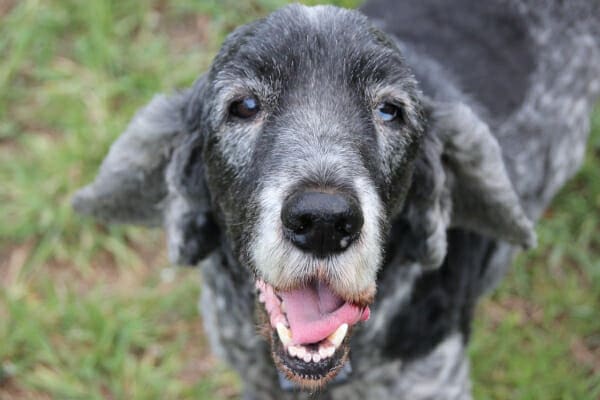
Dogs with CCD often have much higher activity of monoamine oxidase B (MAOB), a molecule which breaks down the neurotransmitter dopamine. This signaling chemical, dopamine, plays a role in your dog’s attention, reactions, and moods.
Therefore, it would make sense that having less dopamine is correlated with changes in behavior. When we talk about treatment for CCD, one of the medications, selegiline, actually works by inhibiting MAOB.
As dogs age, they tend to have increased levels of free radicals in their brains. These damaging molecules may ultimately lead to brain cell death. Additionally, levels of other molecules and neurotransmitters may change as the brain ages. All of these factors (brain atrophy, ß amyloid deposits, changes to blood vessels, and altered brain chemicals) together may lead to CCD.
How will my vet diagnose canine cognitive dysfunction?
Unfortunately, the diagnosis of CCD is not always straightforward. There are a variety of other medical conditions that may cause signs similar to CCD. Plus, there is no easy, definitive test for CCD. Thus, the diagnosis is presumptively made through the process of elimination—a senior dog exhibiting the right combination of symptoms with no other explanation on lab tests.
History taking
Your vet will start the appointment with a thorough history. Since our patients can’t talk to us, we vets rely very heavily on the information that you, the dog parent, provide for us. Your vet will probably ask questions about your dog that include:
- Eating and drinking habits
- Current medications or supplements
- Recent changes in the home environment
- Signs of sickness such a vomiting, diarrhea, coughing, being a lethargic dog, etc.
- Behavior changes (what you are seeing, when each change started, and if things are staying steady or getting worse)
If you suspect your dog may have CCD, you can help your vet (and ultimately your dog) by taking some videos of your dog when he or she is acting abnormally. This way your vet has a good idea of what you are seeing at home since your dog may act very differently in the clinic setting.
It also can be beneficial to create a timeline that records the behavior changes, when you first noticed them, and how they have progressed. The written timeline helps you organize your thoughts ahead of time and helps your vet track the symptoms.
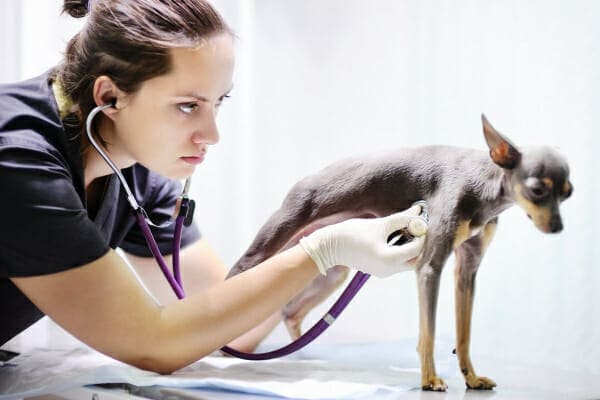
Medical tests for CCD in dogs
Next, your vet may want to run blood tests for dogs and other tests to rule out diseases that can look similar to cognitive dysfunction or may make its effects worse. Some of these tests may include:
- Complete Blood Count (CBC)—This test looks for signs of infection and anemia.
- Blood chemistry—A blood chemistry panel can reveal evidence of liver disease in dogs (which can sometimes affect mental ability) or diseases that may cause increased accidents in the house such as diabetes in dogs, Cushing’s disease in dogs, and chronic kidney failure in dogs.
- Urinalysis —A urine test to rule out urinary tract infection in dogs and assess urine concentration and contents.
- Thyroid screening—A test to rule out hypothyroidism, which impacts metabolism and can manifest with neurologic signs.
- Other diagnostic testing such as X-rays, CT scans, or MRIs.
Canine cognitive dysfunction rating scale
There are a variety of tools or rating scales that your vet may use to assess your dog’s behavior. One such canine cognitive dysfunction rating scale is the Canine Dementia Scale (CADES). This tool evaluates your dog on 17 distinct areas spread across the categories of spatial orientation, social interaction, sleep-wake cycles, and house soiling. Each criteria is assigned a numerical score based on how often it occurs. The vet can then use the sum of the scores for all criteria to determine the degree of cognitive impairment or dysfunction.
A Frontiers in Veterinary Science article provides the Canine Dementia Scale (CADES) and explains how it was validated if you are interested in learning more about it.
What are the treatment options for canine cognitive dysfunction?
Many dog parents may assume that cognitive decline is part of normal aging and nothing can be done. However, this simply isn’t true. Canine cognitive dysfunction is a real condition and the symptoms far exceed what could be considered “normal” for senior pets.

Unfortunately, CCD is a progressive condition and the progression differs in each dog. But even so, there are medications, treatments, and at-home changes that can help improve your dog’s quality of life and slow the progression of CCD.
If your veterinarian has diagnosed your dog with canine cognitive dysfunction, you may be familiar with some of these treatment options for your beloved dog.
Canine cognitive dysfunction supplements
There are several dietary supplements that may benefit dogs with CCD. These include:
- Melatonin—This “hormone of darkness” can help your dog sleep appropriately and may reduce anxiety. (More on the benefits of melatonin in our special section on dealing with sleep-wake disturbances below.)
- Fish oils—The omega-3 fatty acids for dogs found in fish oils can help promote brain health.
- Senilife®—This supplement is high in antioxidants which may help reduce brain aging behaviors (antioxidants help combat the free radicals in the brain of dogs with CCD).
- S-adenosylmethionine (SAM-e)— Dogs on a SAM-e supplement may show improved executive functions and may have lessened clinical signs.
- Medium-chain triglycerides (MCTs)—MCT oil for dogs can provide an easy-to-use energy source for the brain and may help improve brain function in dogs with CCD. My team and I created Dr. Buzby’s Brain Boost™ organic MCT oil for dogs in response to the need for a high quality MCT oil product that is specifically formulated for dogs.
Medications
Your veterinarian may suggest several medication options for your dog with CCD:
- Selegiline (Anipryl®)—This medication inhibits the action of MAOB (which is unusually high in dogs with CCD). By doing so, selegiline for dogs increases the levels of dopamine in the brain. This reduces the clinical signs associated with CCD. In one study, 77% of dogs responded favorably to selegiline therapy after one month. As a word of caution, selegiline should not be given in combination with certain other medications, so always ensure that your vet knows all medications and supplements your dog is taking.
- Additional medications—Some dogs with CCD may benefit from anti-anxiety or anti-depressant medications, especially if anxiety is a big component of the dog’s symptoms.

Food/diet
While I typically recommend home-cooked diets over prescription diets for dogs with medical issues, brain-boosting diets are one place where I strongly support the commercially available options. Dogs with CCD can benefit from diets that include high levels of specific antioxidants, essential fatty acids, vitamins, and substances that decrease free radical production.
Hill’s® Prescription Diet® b/d Canine for “brain aging care,” and Purina® Neuro Care are both prescription diets that do an excellent job of supporting brain function. There is also an over-the-counter diet, Purina® Bright Minds, which can also help with brain support.
Be advised that it may be several months before you see results from these diets. Although it takes time to see results, these diets are worth sticking with because they are an easy way to boost your dog’s brain health.
Additional options
Some dogs may also benefit from anxiety-reducing compression garments such as a ThunderShirt. Another option is using Dog Appeasing Pheromone (DAP) products. These release a calming scent that promotes feelings of security and comfort for dogs while being undetectable to human noses.
Tips for at-home care: 5 things you can do for your dog
Making your dog comfortable at home will play a big part in your dog’s quality of life. The list below includes five at-home care tips that I share with my clients.
However, don’t feel like you have to be constrained to these tips alone. You know your dog best! Observe his or her behavior then make alterations in your home that you think could be helpful for his or her specific situation.
1. Establish a daily schedule and keep a routine.
In general, many dogs thrive on routines, but even more so when they develop CCD. Getting up, going outside, eating, walking, and going to bed at a predictable time can help your dog feel more comfortable in his or her surroundings. Plus, he or she has a better idea of what to expect each day. Obviously, there are going to be times when circumstances require a change of routine, but whenever possible try to stick to your set schedule.
2. Help your dog enjoy appropriate physical exercise.
Getting outside for some fresh air and exercise is great for a dog’s sense of wellbeing. What this looks like may vary a bit depending on your dog’s physical health. Some dogs may be up for exploring new neighborhoods, hiking, or going to new parks. Other dog’s with more physical limitations may enjoy a short jaunt around the yard or to the neighbor’s house. Watch your dog carefully for signs of pain or tiring, and let him or her take frequent breaks to sniff or rest for a few minutes.
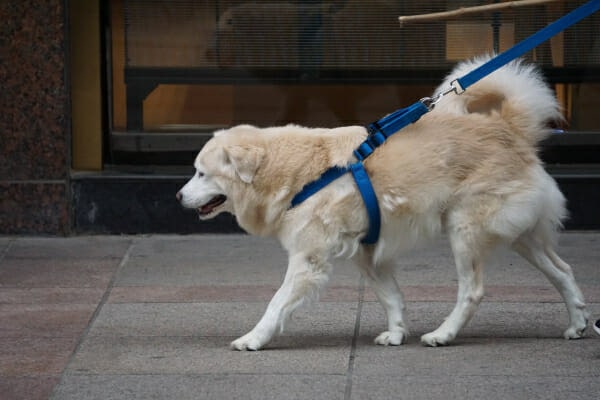
Some dogs may also enjoy playing fetch, wading in a creek (be careful with swimming if your dog is easily disoriented), or running around the yard with a doggie friend. Again, pay close attention to how your dog is doing and give him or her rest breaks fairly often.
3. Give your dog appropriate mental stimulation.
In addition to physical exercise, dogs with CCD also greatly benefit from mental exercise. This can take a variety of forms:
- A “sniff-ari” (i.e. sniffing safari) where your dog gets to leisurely take in all the scents of his or her surroundings. The new smells provide mental stimulation and also serve as a natural break time on walks.
- Teaching your dog new tricks (because old dogs can learn new tricks!)
- Giving your dog puzzle toys where he or she has to lick, roll, chew, or otherwise manipulate the toy to get to the tasty food or treats inside. Have several of these puzzle toys and rotate them so your dog gets a “new” one each day.
- Playing brain games with your dog (a quick internet search will reveal dozens of possibilities).
- Providing new toys to play with (and playing with them with your dog).
4. Safeguard your dog.
Keep your dog safe by:
- Closely supervising him or her in new or unfamiliar areas.
- Ensuring your dog is wearing a collar with an ID tag and is microchipped. This will help increase the chances you are quickly reunited if your dog does get lost.
- Blocking off dangerous areas of the house or yard such as a swimming pool, ravines, or steps if your dog is easily disoriented.
- Keeping your dog on a leash or in a fenced yard to prevent him or her from straying into the road or getting lost.
- Giving your dog a safe haven. This may be a room or area of a room where your dog can retreat for some peace and quiet when feeling overwhelmed.
5. Help your dog (and you) get a good night’s sleep.
- Establish a nighttime routine that includes one last late-night walk so that your dog can urinate before bed. This will help prevent accidents in the house. It will also reduce your dog crying to go out in the middle of night. Additionally, having a nighttime routine will signal to your dog that it is time to settle and get some rest. Senior dogs (and humans) seem to do best with a consistent schedule.
- Ensure your senior dog has soft, orthopedic bedding to avoid putting pressure on arthritic joints.
- If your dog does get up in the night, place night lights around your home so that he or she is able to traverse without bumping into furniture.

How canine cognitive dysfunction disrupts sleep-wake patterns
While we’re on the subject of sleep, let’s discuss sleep-wake patterns and canine cognitive dysfunction. Changes in your dog’s sleeping habits can disturb everyone in the home and cause additional stress. The best way to describe the importance of addressing sleep-wake changes associated with CCD in dogs is through a real-life story.
A real-life example of how canine cognitive dysfunction disrupts sleep patterns
A couple of years ago, a gentleman came to me as a new client asking me to acupuncture his geriatric dog who frequently paced and barked at night. Though acupuncture can be helpful for dogs with sleep-wake cycle disturbances, I had never been asked to treat a case like this before. Hearing his story, I certainly developed a more acute sympathy for dogs who exhibit these symptoms and the people who love them, because both suffer.
The gentleman described his wife—the dog’s caretaker—as being on the verge of a nervous breakdown. Like many moms, she was a light sleeper. At night, she would awaken when the dog began panting and pacing. She got up and tried to settle him by taking him outside, offering water, turning on a fan, and moving to other rooms in the home. Nothing helped. The nighttime ritual had to run its course until the exhausted dog and woman fell asleep in the early morning hours.

I know this is not an isolated case of sleep deprivation for senior dogs and their owners. Over the years I’ve heard many similar stories. In fact, if you have a senior dog, you may identify with these exhausted dog parents.
While there are many reasons why your dog is panting and restless, if the root cause is CCD (or CCD is one of the contributing factors), there are solutions.
Next, let’s get into the nitty-gritty on why taking a “wholistic” approach to getting a restful night’s sleep is critical for a dog with CCD.
Altered sleep patterns and CCD in dogs
As discussed above, altered sleep-wake cycles are a common symptom both in Alzheimer’s and canine cognitive dysfunction (which is why CCD is sometimes called sundowners in dogs). Depending on the canine patient, there could be other medical conditions or factors playing a role in senior dog anxiety at night, including:
- Arthritis pain in dogs causing an inability to settle/get comfortable at night
- Blindness throwing off the dog’s internal clock
- An increased urge to urinate due to diabetes or Cushing’s disease in dogs
- Anxiety
Interrupted sleep-wake cycles definitely affect the quality of life for the dog. But also affect the quality of life for the owners. Pet parents often report that the quality of their own sleep is affected by the sound of their dog pacing and moving around the room. They may also experience anxiety and guilt because their dog appears uncomfortable or is crying out when he or she gets “lost” and confused in the home.

How do melatonin supplements help dogs with canine cognitive dysfunction?
As animals age, the production of melatonin decreases. Younger animals and humans have higher levels of melatonin compared with adults of the same species.
Melatonin supplementation helps increase the levels of melatonin in the body and encourages dogs to sleep appropriately. There is some evidence that melatonin may also decrease anxiety, which is another common symptom of CCD.
Whether or not cognitive dysfunction is an issue for the dog, melatonin has another benefit. Senior dogs often suffer from impaired vision, and blindness affects sleep-wake cycles.
Sleep-wake cycles can be altered with blindness, because the brain does not receive the signal from light to produce melatonin. In humans, the condition is known as non-24-hour sleep-wake disorder, where the body’s biological clock does not match the traditional 24-hour day. Melatonin is used to reset the natural circadian rhythm and can be very helpful for blind dogs in this same way.
Finally, melatonin can benefit senior dogs by reversing certain types of hair loss and treating certain auto-immune diseases. For more about the many benefits of melatonin, please read my companion article: Melatonin for Dogs.
Safety note about xylitol in melatonin supplements
Some melatonin supplements, especially gummies, may contain the sugar substitute, xylitol, which is toxic for dogs. Always check the label for xylitol (also called birch sugar) before giving the supplement to your dog.

Taking a multimodal approach to helping your senior dog sleep
It is important to bear in mind that there may be several factors affecting your senior dog’s sleep pattern. For example, a dog may not only have canine cognitive dysfunction, but may also have a painful condition such as arthritis or a disease that may increase the urge to urinate such as Cushing’s, diabetes, or chronic kidney disease. Diuretic medications, such as lasix (furosemide) for heart disease in dogs may also increase the need to urinate and disrupt nighttime sleep.
So, while melatonin may help your dog sleep, there may be other management techniques to consider as part of a multimodal approach to managing doggie dementia and other elderly dog issues.
What is the prognosis for dogs with CCD?
Some dogs with more mild forms of CCD are able to live out their full lifespan with good management. However, this isn’t the case for all dogs. Unfortunately, CCD does tend to be progressive. This means that even with multiple interventions and the best possible care, the symptoms may continue to worsen.
Unfortunately, dogs with severe CCD often have symptoms that significantly impact their quality of life despite trying many treatment options. One study indicated that dogs with severe CCD are often euthanized within 18-24 months of diagnosis.

Making the decision for euthanasia
CCD is a difficult and devastating diagnosis for dogs and their parents. Your dog may be physically healthy yet suffering from severe mental or behavioral challenges. Unfortunately, many parents of dogs with CCD will have to wrestle with the decision about when to euthanize their sweet pup. It isn’t a decision that I can make for you, but I want to offer you a few articles that might help:
- Dementia in Dogs: When to Euthanize Your Beloved Senior Dog
- How Will You Know When It’s Time to Euthanize Your Dog?
- Preparing for Your Dog’s Euthanasia: 10 Thoughts for Peace
- In-Home Dog Euthanasia: Heartfelt Answers to 12 FAQs
I want to assure you that severe CCD signs are a valid reason for deciding that euthanasia is the right choice for your dog. You aren’t giving up on your dog. And you aren’t being selfish because you are tired of being kept up all night or cleaning up accidents. CCD steals your dog’s dignity and sense of self.
I understand what a heart-wrenching decision it is even when you know it is the kindest thing you can do for your dog. And I think that chances are, you will know deep down in your heart when it is time to set your dear dog free from the confines of a mind ravaged by CCD.
Partnering with your veterinarian for your senior dog’s sake
You are your senior dog’s biggest advocate. I encourage you to speak with your veterinarian if you notice any behavioral problems or changes with your dog including increased accidents, pacing at night, or increased anxiety. Based on the assessment, your vet may be able to prescribe medication and/or supplements to better manage your dog’s condition. Your dog’s veterinarian is always the best source of wisdom in making those changes.
Finally, please find comfort in the fact that, through managing your grey-muzzled companion’s CCD symptoms and helping your dog get better sleep, you are improving your beloved dog’s quality of life. And even in the midst of CCD, you and your dog can still have many wonderful times together and make lasting memories.
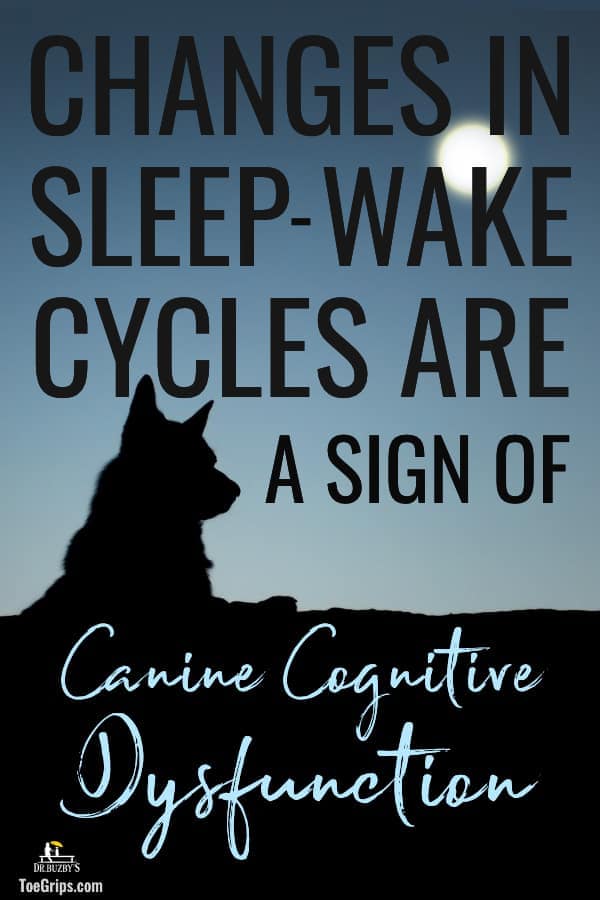
Is your senior dog showing signs of CCD?
Please comment below. We can all support each other.
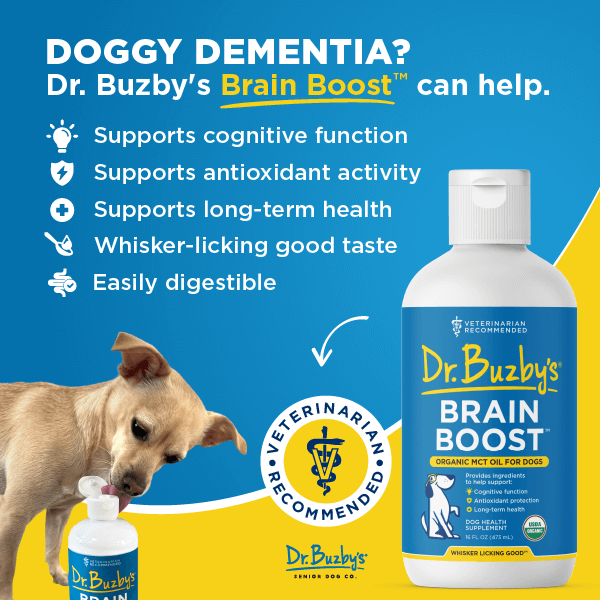


My 6 year old beagle lab mix rescue went to the ER on January 2, with what was maybe a flare up of IVDD (he had surgery in summer 2022). He got a methdone shot, was put on a 3 week course of prednisone, gabapetin and trazadone. During week 2 he developed irritation and incessant barking in the late afternoon early evening, only thing that would calm him was laying in a dark room with him (but i can’t go to bed at 7 Pm every night). He’s been off the prednisone since the 23rd of january and still experiencing this irritation and incessant barking every day. I feel like it’s something cognitive happening. I have an appt again in a few days.
Dear Kathleen,
I am sorry your pup is experiencing these worrisome symptoms. I agree, it does sound related to cognitive function. I think it is wise you are planning to have your vet do a thorough evaluation. What did you find out? How are things today? Hoping you were able to get some answers and praying for relief for your sweet boy.
Our 16 1/2 year old mini dachshund was diagnosed with CCD a couple of months ago. His cognitive decline came on pretty fast. He has severe clouding in his eyes and can’t see well and his hearing is going bad. He is either in a corner sleeping or pacing in circles around the house. He startles very easily and constantly shakes. He no longer sleeps with us or sits with us. Petting him is no longer a thing either. He freaks out when we touch him. He goes outside to go to the bathroom and forgets why he went outside only to come inside and immediately go on the carpet. He stands and stares at the water bowl and his kibble bowl. I have to sit on the floor by his bowl and encourage him to eat at scheduled meal times. He is now terrified of his 4 year old basset sister. Our vet told me that any time is ok to let him cross the rainbow bridge. I know it is very near his time, but my husband and 2 sons (15 and 8) don’t agree. So, I continue to do the things I have been doing until they can get on board.
Dear Brandi,
I am so sorry you are in this emotional situation with your senior guy. I agree his quality of life sounds poor and saying goodbye may be the most loving option. I can only imagine how difficult this must be for you as you try to talk to your family about what is best. I will attach links to other article that offer additional information and may help with how to navigate these discussions. Praying for strength and comfort for your heart. Bless you and your sweet boy. ♥
1. Using a Quality of Life Scale for Dogs
2. Dementia in Dogs: When to Euthanize Your Beloved Senior Dog
3. How Will You Know When It’s Time to Euthanize Your Dog? 5 Caring, Heartfelt Messages
4. Preparing for Your Dog’s Euthanasia: 10 Thoughts for Peace
This is very helpful. I have a 17-year-old Pug who has been healthy up to a month ago except for his vision. A month ago, he developed vestibular disease, and he has recovered (no falling over and only a mild head tilt). Unfortunately, he has started barking randomly and loudly in the middle of the night. It breaks my heart and, selfishly, is negatively impacting my health because of the lack of sleep. I feel awful for even thinking this way, but I am having a hard time functioning and am worried sick about him and maintaining some quality of life for him until the end. I will give him melatonin to help with his sleep cycle and anxiety. I will follow some of the other advice in this article, as well. Thank you,
Hi Kathleen,
I am sorry your senior guy is suffering with the symptoms of dementia. I think trying melatonin is a good idea and your vet may also be able to prescribe something for anxiety if needed. I will attach links to other articles with more information and great comments from other readers. Hoping you will be able to find the answers you need and also realize you are not alone! Praying for your strength as you walk this difficult path. Wishing comfort and peace for everyone in your home.
1. Signs of Dementia in Dogs: Stages, Symptoms & Treatment
2. Senior Dog Anxiety at Night? 9 Solutions for Better Sleep
3. When Caring For A Sick Pet Becomes Too Much: Pet Caregiver Fatigue
I can’t tell you how help this (and the other linked) articles are right now. We had a particularly rough night last night with our senior English Bulldog who will be 10 in November. He as diagnosed 3 months ago with Cushings and is on medication for that. By his labs and some physical signs he is better. We also know he has arthritis, and he is on medication for that as well. Despite all this we are still having issues. He is still panting a lot (though not as severely since he started treatment for the Cushings), he frequently just barks (especially at night) and it isn’t always for a reason (potty). My husband had said he thought he has dementia. Now that I have read this, we will be talking with our vet. We already have an appointment on Monday because I am not sure his arthritis pain is managed with the Rimadyl. Now I’m thinking it is a combination and have better insight into what to discuss with the vet.
Hi Deirdre,
I am sorry your senior guy is facing so many issues at once. I am glad the article was informative and offered insight to this tricky situation. How was the visit with your vet? Hoping you were able to partner together to form a treatment plan to give your sweet boy additional relief and comfort. Praying for clarity and strength as you continue walking this difficult path. Bless you!
My 16 years old disabled dog passed away last month, we have no idea of her exact age since we rescued her from the shelter (she could be around 14-16 years old). Her front leg was amputated because of car accidents (twice). Her hind legs gave up on her about a year ago prior her passing. The vet did somehow mentioned senior dogs above 12 years old would likely affected by CCD, but may I just ask how can we tell senior dogs with mobility issue (she wasn’t able to get up on her own) has CCD? Since some of symptoms wouldn’t be obvious such as panting/pacing, disoriented & get stuck in corners of the house etc. Asking this for my furbaby although she is no longer here with us… She had no house-soiling issue because we expressed her bladder manually (well, accidents in the house prior we learned manual bladder expression). She did sleep more often but I believe this is quite normal for all senior dogs.. Are there any more obvious symptoms we could tell for physically disabled dogs?
Dear Charlie,
I am sorry for the recent loss of your beloved girl. Some other symptoms of dementia can include loss of joy from activities that used to be exciting (like when you come home from work, or offer treats or food), no longer seeking attention from family and friends, no longer responding to their name being called, or seeming uninterested in daily activities. Hoping this will help offer clarity and closure to this emotional situation. Wishing you brighter days ahead and may your girl’s memory be with you always.
I have an 8 year old mixed breed pup. He started showing signs of withdrawal and lacking interest in anything that brought him joy before after a dental cleaning. He literally went in as one dog and came out as another. This was November 2023. It’s now June 2024 and he has kept significantly declining. It’s started with the lack of interest in past joyful things, including food. Then weight loss – 5 pounds in 4 months. Then 6 more pounds in 3 months. The quickest amount of weight loss seemed to have happened when my husband and I went to Hawaii for 9 days and the dogs stayed at our house with my dad – who they love. All bloodwork has come back fine. Doctor has put him on a cocktail of antibiotics and prednisone – which seemed to have helped. Temporarily. We saw glimpses of his personality. He’s down to a half a prednisone pill every day and his symptoms of confusion, pacing, getting stuck behind furniture have returned as of today. This is heartbreaking. I’m just wondering if this is common after anesthesia. And if there is possibly something we are missing.
Dear Katie,
My heart aches for you as you face this difficult situation with your boy. Unfortunately, yes, anesthesia can cause dementia to progress and become more apparent. I am sorry the symptoms have returned with the decrease in prednisone. While higher doses of steroids can cause issues with long term use, they may offer more benefits than risks to your boy at this stage in life. I will attach links to other articles with more information about dementia (cognitive dysfunction) in hopes you may come across some ideas of things to discuss with your vet. Praying for relief and healing. Wishing you all the best as you navigate this emotional path.
1. Signs of Dementia in Dogs: Stages, Symptoms & Treatment
2. Selegiline for Dogs: A Helpful Medication for Canine Cognitive Dysfunction
3. 13 Mental Stimulation Toys for Dogs (& Activities Too)
4. Dementia in Dogs: When to Euthanize Your Beloved Senior Dog
“anesthesia can cause dementia to progress”… I always have this doubt in mind about my 16 years old dog who underwent anesthesia for lipoma removal surgery in Dec 2021. Noticed some trembling issues days/weeks post the surgery, always wonder if it has anything to do with anesthesia. Do you think anesthesia somehow could affect her mobility issues since her hind legs gave out slowly about a year or so later.
Hi Charlie,
I understand your need for closure with all of these unanswered questions you have surrounding the years leading up to your girl’s passing. I just responded to your other comment and hope you will see that reply as well. Without having played a personal role in your dog’s medical care, it is hard to make specific conclusions. I would not think anesthesia would cause this type of complication, but I guess anything is possible. It is normal to ponder all the “what ifs” while grieving, but I hope with time the grief will fade and your heart can begin to heal. Praying for comfort and peace as you continue life’s journey. Bless you.
Murphy, our 14 year old cockapoo has all of the signs of CCD. We tried, per our vet’s instructions, Anipryl and Trazodone but he was much worse. We stopped those drugs and have managed better with Melatonin getting him through the nights. He had never soiled in the house but now will pee and poop even with us right there. He has severe hip dysplasia and is on 100 mg of gabapentin twice a day.
He is now having trouble getting up on his feet with his front legs splaying out. We have hard wood floors but have put down many area and throw rugs and even on these he can’t seem to get up sometimes. Is this also a symptom of CCD or hip dysplasia or is he perhaps having mini strokes?
We love him dearly but he has been a challenge with aggressive behavior at times and has bitten me and one other person. Because of this and his hip dysplasia we are reticent to pick him up or try to help him get up. It has also affected the way the Vet tries to take care of him. We feel helpless.
Thank you for your informative website which helps us to know we are not alone.
Dear Joanne & John,
My heart aches for you as you try to navigate this difficult path with Murphy. His mobility and weakness in the front limbs do sound more arthritis related or neurological and is not associated with his dementia. I know you want to do everything you can to give Murphy more time, but with all of the struggling he is experiencing daily, and especially with him becoming more of a bite risk, saying goodbye may be the most loving option. Does he still have activities he enjoys? Does he seek affection from family members? Is he truly living or just merely existing? We often focus on giving a beloved pet a good quality of life, but a peaceful goodbye is just as important. I will attach links to other articles with more information on how to know when it is time to let go. Praying for your strength and clarity as you face these emotional decisions. Wishing you all comfort and peace. ♥
1. Dementia in Dogs: When to Euthanize Your Beloved Senior Dog
2. Using a Quality of Life Scale for Dogs
3. When to Euthanize a Dog With Arthritis: A Vet’s Heartfelt Advice
4. Preparing for Your Dog’s Euthanasia: 10 Thoughts for Peace
I have a German Shepherd with moderate DM who also appears to have some symptoms of doggie dementia. He stares at the front door, the fireplace, furniture, the closet door, etc. He has lost some of his hearing and can no longer locate where sounds are coming from. He seems confused at times, he has stopped playing with his toys. He also snarled at me a couple of times recently, once when I was trying to help him off the floor when he got stuck and was sliding and once when I tried to adjust a placemat that was covered with food residue given as a treat. He has always been a somewhat anxious dog, but we have worked with him, applying a variety of training techniques using rewards, since he is very food motivated. My husband is his person, although he has been a family dog. The vet guessed his age at 12 or 13, he was found as a stray so we don’t know his exact age. We’ve had him for almost 7 years and since I retired a couple of years ago, I am with him all day from early morning until late at night. We split caregiving about 50/50. He sleeps well at night and we have nightlights on for him to navigate to his water bowl and around the house. We also have throw rugs everywhere to make it easy for him to get around.
Are these symptoms typical of doggie dementia? Should I be worried about his aggression toward me? He does not display this kind of behavior to my husband or my adult son.
DM related information for background:
He has had three sessions of cold laser treatment and acupuncture, which did cause some anxiety for him. I do not think we will be doing any more of those treatments, since it’s hard to estimate the benefit versus his anxiety during the treatments. He is taking Rimadyl daily and just had his second 30 day shot of Librella for arthritis pain in his front legs.
Dear Despina,
I am sorry you are facing this difficult situation with your senior Shepherd. He is very lucky to have you taking such good care of him and advocating for his continued health and well-being. What you describe does sound like typical dementia/cognitive dysfunction. And unfortunately, we do sometimes see aggression as their condition declines. I do think you should be cautious and very careful since he has been showing some aggressive tendencies toward you. This may end up being the thing that forces you to make some tough decisions in order to keep everyone safe. I would also offer a word of caution about Librella. It is still very new, and we are learning more about this therapy as we go, but there has been some evidence to show that it may not be a good idea to use it in dogs with any sort of neurological problem (such as DM). I would recommend you bring up this topic with your vet and have a good discussion on safety vs effectiveness. Wishing you all the best and praying for strength and peace.
Two things:
1) Please mention that many chewable/dissolvable melatonin tablets have xylitol in them these days. Please read the ingredients before you give them to your dog! Xylitol can easily be lethal.
2) I had VERY good luck using phosphatidylserine with a dog that showed signs of CCD (panting and pacing all night). I didn’t realize quite how much it was helping her until I ran out for a few days. I made sure I never ran out again. She was a 55 lb Aussie and lived until 16 1/2.
Hi AussieMom,
Thank you for bringing up these important bits of information! You are absolutely correct about the dangers of some human melatonin supplements containing xylitol. The main ones that seem to be a problem are gummies. This issue is addressed in our melatonin article: Marvelous Melatonin for Dogs
This article on CCD was last published in 2021 so it is due for some updates. Also, there is a new product I love called Senilife which contains phosphatidylserine along with other great supplements to help with cognitive dysfunction. Again, thank you for being proactive and ensuring other readers have this great information!
What pain medication can be taken with Selegiline?
Hi Abby,
Selegiline is safe to use with most pain medications. Of course, always discuss medication changes with your vet to avoid the risk of unwanted side effects. Here is a link to another article with more information: Selegiline for Dogs: A Helpful Medication for Canine Cognitive Dysfunction
Thank you for this article. I’ve been deep diving in CCD research for my 10 yo Husky. However, I’m beginning to worry it’s something else. We rescued him 4 years ago. Every winter it seems he gets a bit anxious or develops some odd behaviours. Last year in particular we began thinking about CCD and sun downing, as every night he would whine and cry. No pacing or confusion or anything, but just consistent whining at nighttime. This winter it’s the same, but perhaps even worse than last year. But the odd thing is that it came on so suddenly at the beginning of Fall. And given that we noticed these behavioural changes during every fall/winter season, I wonder if it truly is CCD, as he’s never ever exhibited such signs during the summertime. During the summer he does spend quite a bit of time outside as well, so I wonder if that additional stimulation is playing a role. I’m at a loss for what to do. We have him daily on Omega 3 oil with Vitamin E and antioxidants, SAMe, Silymarin, Lions Mane, Melatonin (given at nighttime), and sometimes some calming treats as well. Anxiety shirts don’t help, sedatives or anxiety meds don’t help. I’m going to speak to the vet about switching to a brain aging diet. But I’m in desperate need of additional solutions or further insights. Can CCD be just whining at night? I’ve heard it can be worse in the winter but is it possible for the symptoms to fully disappear in the summer?
Dear Rachel,
I understand your concern for your senior guy and these worrisome behavioral issues he is facing. I agree this does not sound like typical CCD symptoms. It might be time to consider a consultation with a specialist. I am not sure if it would be better to reach out to a neurologist (thinking brain as a source) or a behaviorist. They may recommend some advanced testing such as an MRI, but I can’t say for sure what the next best step would be. I think the supplements you are using are great. Integrative medicine may also offer some benefits. Have you thought about acupuncture? Hoping you can get some answers and find a way to offer your sweet boy some relief. Wishing you all the best and for a clear path forward.
My 15 yr old Pug currently on Seleligine for CCD. I have noticed improvement but night time is bad with panting, restlessness, disorientation etc. just cannot settle. We have tried adding 1/2 Xanax at night (per vet) but not seeing much difference, may even be adding to anxiety. Is it safe to give seleligine and melatonin? If so, is melatonin fast acting? What time schedule would you recommend? Thank you!
Hi Jodi,
I am sorry your senior Pug is struggling with the symptoms of CCD. Your dog is very lucky to have someone like you advocating for their health and well-being. I am not aware of any contraindications to giving selegiline and melatonin together. With that being said, I highly recommend you discuss the use of melatonin with your vet. They are more familiar with your dog’s specific case details and can give you the correct dosage to use. Here is a link to another article with more information: Marvelous Melatonin for Dogs
Best wishes to you both for many happy days ahead.
Hi there –
I have a senior dog just like the ones I read about in this thread. 16 years old and the love of my life. The shaking, trembling, random vocalizing/whining, barking after falling and can’t get up, blindness, sleepless anxiety pacing/circling, incontinence is causing about the most stress I’ve ever had. After some trial and error, I’ve found a few things that help my dog calm down and sometimes sleep almost through the night.
Some tips I thought I’d share are:
– Consistant CBD oil throughout the day to build it up in their system. Follow the instructions of your brand. I use treats too but the oil works faster. I interchange depending on his behavior.
– Half dose of melatonin with the CBD oil in the morning and full dose with CBD oil before bed, (according to dog’s weight).
– Sleeping with a dog anxiety vest has helped a lot. If you can’t get a vest, placing a sturdy pillow on top of them when they lay down is calming. Use the vest during the day when they start acting up.
– Most anxious dogs like a cover or confined spaces, so building them a small fort or letting them sleep under the bed is soothing to them. I have multiple dog beds so I will put him in one and place another over the top of him.
– Very firm full body bear hugs with vigorous petting of carriage are good to calm them down.. As in this video https://www.youtube.com/watch?v=iXR-alS9qpU. 5 minutes of this and my dog stops trembling. Firm head and ear massage is soothing as well as applying acupressure points.
– If your dog is an only dog like mine, they don’t have a furry friend to lick their head and groom them which they miss out on. I use a warm wet washcloth to wipe and stroke his face and head. He thinks someone is giving him a tongue bath and settles down.
– Making little treasure trails of their treats on the floor gives them something to concentrate on as they try to sniff out where they are and takes their focus off circling and pacing. I break them into small little pieces so it prolongs the activity and not overfeed. Or use kibble. And at least it gives their pacing a purpose. Which they’re gonna do anyway. I have found nothing that stops the pacing, although the CBD and melatonin combo makes it not as frantic. It’s a calmer pace.
– As far as incontinence; old sheets and towels from the 2nd hands store are a great investment. And wee-wee pads are your best friend. I use all to line dog beds or the places he likes to sleep. Those combined with an indoor adjustable panel dog pen give him good space and a confined area I can keep clean. I usually use the pen to block off most of the den for him or a part of the kitchen.
– Flushable wet wipes to clean incontinent messy dog butt are a must. (Although I’ve always wiped my dog’s butt since they get skidmarks too. I keep an old soap dispenser with a mild soapy mixture and a stack of restaurant napkins to wipe his bottom after every poo. I save every takeout napkin for this purpose),
Anyway, I hope these tips can help some find a bit of ease and peace through this miserable and sad time.
I cry everyday but I 100% owe him for being my soulmate & for the last 16 years of being pure happiness constantly by my side. Every single day I can kiss & hold him is a gift. It will be like losing a limb when the time for him to journey on comes.
Godspeed.
Btw – I just realized I got the melatonin ratio mixed up. I meant I give the smaller part of my dog’s dose in the morning and the larger part before bedtime. For instance, my dog’s daily does is 1.5mg. for his weight. I give him the .5mg in the morning with the CBD and the 1mg at night before bed totaling 1.5mg for the day. Both with his CBD dose. (I wish I could edit that but hopefully you see this reply/update).
your a great dog mom. I went thought the same with my boy a Jack Russell terrier. The love of my life. He lived to 19.9 years and 2 weeks. CCD is devastating and it was like watching my boy disappear slowly although he knew me right to the end. In the last 6 months he was having seizures which we controlled with medication & diet it worked, but it only gave us a bit more time. I was very greatful to have him as long as I did. My beautiful boy is now at peace playing over the rainbow bridge.
Hi Lina,
Thank you for sharing your experience and advice with our readers. I am sure others will find some great tips here to try with their own dogs. Your pup is lucky to have shared his life with you and it is obvious how much he is loved. Wishing you both the best!
Looking for a reliable brand of melatonin for my senior dog with cognitive dysfunction. Doctor suggests melatonin but does not suggest which Brand is the safest without additives. Would appreciate some suggestions. Thanks
Hi Sue,
Most specialists will say they have concerns with quality control in all over the counter supplements. With that being said, it seems Nature’s Bounty is the most prescribed brand in my area.
August 1st 2022 4:15pm 15 yr 11 month smart, kind and sensitive Black Havarnese Cassidy passed into the Loving embrace of the Lord with Peace and no distress.
The tears have not stopped! I miss Cassidy so. May Cassidy’s memory be eternal.
A week later, Cassidy was buried with his cuddly Brother Butch, a 13 yr old who had passed three years ago. Butch ever so missed as well.
While Cassidy did not pass away from dementia and more likely from muffled lungs, coughing and possibly fluid in his lungs….Cassidy did have some dementia and showed signs of what is much described….however I am keenly interested in learning who as Veterinarians are focused on helping our canine “family members” with cognitive decline?
If anyone has information on Canine dementia research, I am very interested in learning more about present research?
Located here southwest of Boston
Thank you.
[email protected]
Hi Christopher,
I am sorry for your recent loss of Cassidy and the passing of Butch three years ago. It is true that no matter how much time passes, the imprint left on our heart never fades. You will be glad to know there are many scientists and veterinary scientists researching possible treatments for canine cognitive dysfunction (CCD). CCD is almost identical to Alzheimer’s disease in humans as both are caused by a buildup of B-amyloid plaques in the brain. There are many new drugs and treatments being tested to try and slow the progression of this tragic disease. If you want an idea of the latest research, I recommend looking at the PubMed website. Here is a link:
Using this website, you can search any topic to see what articles and studies have been published. Many of the articles are only available as abstracts or short summaries. I hope this gives you a starting point in your own search. Best wishes and good luck!
My wife and I are dealing with dementia on two fronts. My wife’s father has severe dementia and spends a good part of the evening taking care of him. I am taking care of a 15 year old Lhasa who has many of the symptoms of dementia. We are trying an expensive new diet, but with little improvement. We are going to try and take a much needed vacation later this summer but I am very anxious about leaving her at the border. My wife and I really need to start having a life!
Hi Brent,
My heart goes out to you and the difficult situation you are in with your pup and family. Being a caregiver is definitely not for the faint of heart. You are right that you and your wife need to make sure you are taking care of yourselves. Your quality of life matters too! I am sorry you aren’t seeing much improvement in your senior girl. I am not sure how severe her dementia is at this point, but I know eventually you will face the tough decision of when to say goodbye. I will attach links to other articles with great comments that may be of some help when that time comes. I hope you get to take your vacation and your little pup will be well cared for. I wish you all the best.
1. Dementia in Dogs: When to Euthanize Your Beloved Senior Dog
2. Preparing for Your Dog’s Euthanasia: 10 Thoughts for Peace
Hello! I have a 13 year old Cockapoo who has been diagnosed with CCD. He’s a happy boy during the day but nights are a whole other story! He settles fairly easily but wakes up any time from midnight to 2 am wanting to go potty. When he comes in from doing his business he will either pace or shake uncontrollably for hours on end. We have tried changing his diet, which is tricky due to severe allergies, tried calming care supplements, melatonin, Selegiline, and now Trazadone to help him sleep. After trying each option for several months nothing is working! His vet has given up and said to just try and make him comfortable at night….his quality of life during the day is wonderful, he eats, plays, goes for walk and is generally happy although with some slight anxiety. It’s so hard to see him so anxious at night let alone his humans only sleeping on average 4 hrs a night! We are desperate to help him and wondering if you have any advise!
Hi Michelle,
You are definitely in a tough situation, and I can only imagine how stressed and tired you must be at this point. I’ll admit that you have tried almost every suggestion I normally recommend. There is another article that talks about this issue and may have a couple other things to try. Here is the link: Senior Dog Anxiety at Night? 6 Solutions for Better Sleep
It might be worth trying to find an integrative vet or holistic vet in your area that is familiar with Traditional Chinese Veterinary Medicine. They may have access to other supplements or therapies to try such as acupuncture. Please don’t forget that when thinking about your dog’s quality of life, your quality of life matters too. I hope you get some relief soon and with you both the best.
Hello. I’m writing because I’m struggling on letting my old girl go. She is 16.5 years old. And has been suffering with CCD for about 2 years now. At first I didn’t realize what it was, than found information online. She first started with the waking up once or twice a night scratching at my door to go out. She wouldn’t stop until you let her out. Sometimes she just wanted a drink, Sometimes she would go outside to go potty. Also. while outside she would sometimes run around frantically with no real purpose. She also will wander and pace the house all day unless she’s asleep. I have also noticed while on walks now she will stop alot and look around like she is lost. It’s so heartbreaking to see. She has become very picky on what she eats as well. My baby won’t snuggle anymore either. She will fight to get down. She still knows us and gets around, so I’m really struggling with the thought of putting her down. ?
Dear Debra,
Cognitive Dysfunction is such a difficult disease to deal with and it is heartbreaking to watch a beloved dog struggle with the symptoms. I understand your concern and the internal conflict of making a decision about your pup’s quality of life. Here is another article that may offer some good advice: Dementia in Dogs: When to Euthanize Your Beloved Senior Dog
Since I haven’t personally examined your dog, it is difficult to make specific recommendations. I do think that saying goodbye can be the most loving option in some cases and it is always ok to think about your quality of life as well. I hope you can find the answers you need to make the best decision for you and your sweet girl. Praying for clarity and comfort for the days ahead.
Hello Dr. Buzby! My dachshund Scooby will be 18 in December. He has been loosing his sight and hearing over the last year and he has recently started loosing his appetite and wandering around at night and getting stuck in corners. I have tried to crate him but he just cries and barks. I’ve tried keeping him closed in my room at night but he runs into everything, I do have a night light on but last night I found him standing in front of the night light, then he walked right into it and the plug to the fan and unplugged it trying to get around it. I’ve been spoon feeding him thinks like chicken soup, chicken broth and soft dog food. After reading this article I plan on trying to give him melatonin for the sleepless nights. Thank you!
Hi Carolyn,
It is hard to love a dog so much and see them struggle every day. I am sorry you are going through this tough time with Scooby. I hope the melatonin will help with his nighttime anxiety. Here is a link to another article you may find helpful: Senior Dog Anxiety at Night? 6 Solutions for Better Sleep Talking with a holistic or integrative vet may be of some help. They have a wealth of knowledge about herbal supplements and alternative therapies that may be perfect for Scooby’s situation. I hope you find the answers you are looking for and are able to continue making life long memories with your sweet boy.
I have a Jack Russell (joey) she is 17 years old. I love her so much. she was a pup when i brought her home for my grandson. Now she is mine since I am. retire and have all my time with her. She is taking meds for thyroid and high blood pressure. And she has a lot of cataracts. I can see her cloudiness in her beautiful eyes.
She does walk around and night, goes outside about 10 times and then eats some tricks, and then when she sleeps at night well. But in the mornings her bed is soaking wet. and so is she.. She wets the bed in the daytime as well after she takes her nap. Seems like she can’t or know that she is pewing. Maybe I can find some CBD oil to help her with this.She does drink a lot of water. I have water proof linens because i wash every day her sheets and flannel sheets. Do you think there is something out there that I can do to prevent this. I don’t is very healthy to bath her everyday
Hi Lillie,
Sorry to hear that Joey is having some trouble with urinating while sleeping. Your description sounds a lot like some variety of incontinence. Some dogs have poor urethral sphincter control which causes them to leak urine, especially while relaxed and sleeping. Other dogs may leak urine from overflow incontinence because they have a very full bladder. This tends to happen when dogs are drinking more water and producing more urine. additonally, many other conditions can also lead to incontinence. You can find out more in my article Urinary Incontinence in Older DogsThe good news is that there are often medications or other therapies that can help decrease incontinence. However, without being able to examine her, I can’t say for sure why she is leaking urine or which therapies would be best for her. I would recommend making an appointment for her at the vet so he or she can get to the bottom of the problem and develop a management plan. Best of luck to you and Joey!
I have an 11 year old maltese with the same problem… shaking and panting at night.. i have a small lamp on at night and she sleeps on my bed as always…. She starts stressing the minute i get ready to go to sleep. It can go on for hours and i lose a lot of sleep. I have tried putting her in another room with the radio on plus a lamp but she gets very distressed and i don’t sleep, worrying about her. She is this coming week having a sedative for one week
Only to see if we can break the cycle. It worked for her once before and gave some months of respite…. But having read your article i will purchase some melatonin in the hope it will help. Thankyou for your compassionate article.
Hi Annie,
Sorry to hear about your dog’s shaking and panting at night. It is so difficult when she isn’t sleeping and then you aren’t sleeping either. I hope that the sedative or melatonin will be helpful for her. I also suggest reading my article Senior Dog Anxiety at Night? 6 Solutions for Better Sleep because it goes through some additional ideas that you might find helpful. Here’s hoping better sleep is in the future for both of you!
Dr. Buzby,
Thank you for your article. My bulldog developed anxiety, and barking thru the night. We went through all kinds of medications. One night I put her dog bed in a small room with a baby lamp on, and soft music. She would bark initially but then fall asleep. Whenever the routine was not followed it was a sleepless night. I believe my dogs anxiety was from her losing her eyesight. This started in late 2019. In 2020 with the outbreak of covid being home helped with this routine and time together. Now in spring 2021 we are in her late stage of life and happy for every minute more we get. Getting a vet to treat this ailment is extremely difficult. I was told she had a brain tumor, to put her down, and given high dose medications to make her sleep. It was a difficult road and each dog owner has to figure out what works for their dog and have patience..
Hello,
Thanks so much for sharing your dog’s story and these good words of advice! It is definitely not an easy condition to manage, but it sounds like you found some solutions that work well for your dog. What a beautiful perspective you have on treasuring every moment you have with her during her later senior years. I hope she has many more good days with you! ❤
Dr. Buzby,
Thank you for your in depth article on Canine Cognitive Dysfunction We just said goodbye to our 17 year 2 month old Border Terrier, “Axle” who had this condition. He also had arthritis and was losing his sight and hearing. We supplemented with CBD oil and it was a God-send in making his last year or so more comfortable. It helped with his sun-downing and eased his pain. Thank you for the information on melatonin. I wish I had known this could have helped with his hair loss, too.
Hello Lois, I’m so touched by your story of Axle. Thank you for sharing your experience with CBD oil helping him in his last year and for your kind comment. I’m so sorry for your loss. Even though 17 years is just amazing, I know it’s never enough time.